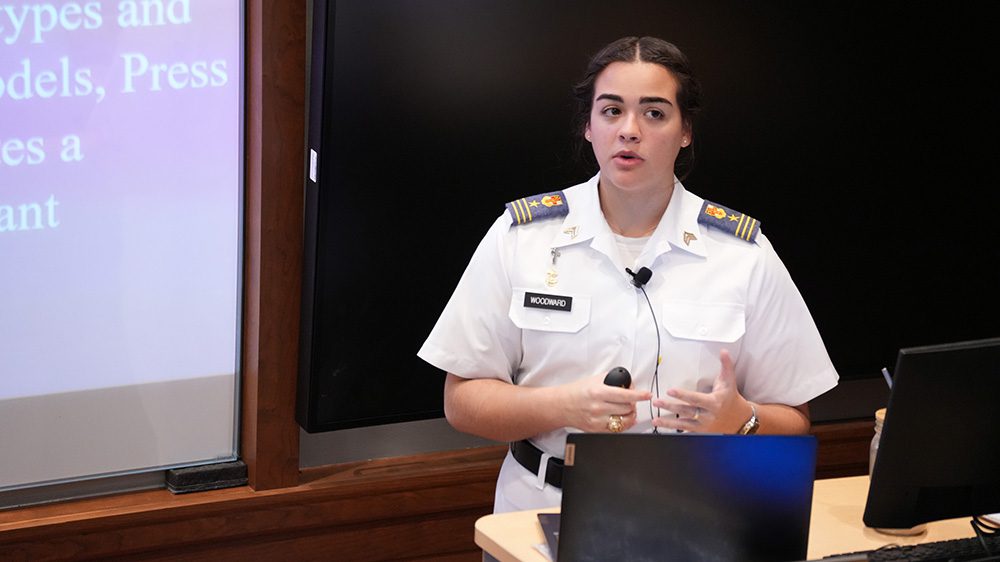Woodward ’24 Examines Press Freedom and Terrorism

Cadet Gabriele Woodward ’24 explains the connection between media freedom and terrorist attacks.—VMI Photo by Kelly Nye.

Cadet Gabriele Woodward ’24 explains the connection between media freedom and terrorist attacks.—VMI Photo by Kelly Nye.
Freedom of the press in the United States is legally protected by the First Amendment of the Constitution. Media freedom is protected in most sovereign nations around the world, but is there a security price to pay for the liberties media enjoy?
Cadet Gabriele Woodward ’24, an international studies major minoring in national security, researched the connection between media freedom and terrorist attacks in her honors research thesis, “Media Freedom and its Correlation with the Frequency of Terrorism.”
Woodward found there is a symbiotic (mutually beneficial as well as detrimental) relationship between the news media and terrorist organizations. “Almost all scholars agree the relationship exists, but they disagree on how influential it is. Through exploitation, it thrives on sensationalism. Terrorist groups enjoy seeing their attacks in the media, and in turn, the media runs stories of the attacks to satisfy the craving for entertainment their viewership desires,” stated Woodward.
Woodward theorized that greater freedom in the media enhances or increases the number of terrorist attacks a country faces due to the symbiotic relationship between media organizations and terrorist groups. She hypothesized, “If a country exhibits a higher level of freedom in the media, then they will experience a greater number of terrorist attacks.”
Before beginning her extensive research, Woodward considered several variables. The independent variable, which cannot be changed by other variables, was freedom of the press. The dependent variable, something that depends on other factors, was the number of violent terrorist attacks intended to induce fear and incite political change. Her control variables (anything held constant in a study to prevent it from interfering with the results) included state capacity (the ability of governments to effectively implement their policies and achieve their goals), regime type (method a government has chosen to wield its power), repression (government controlling its citizens by force), ethnic fractionalization (the variety of distinct cultural groups that exist in a country), and economic development (the measurement of a country’s overall standard of living).
The first model of data Woodward used to conduct her research had poorly defined variables, which caused her to conclude with a result of a negative significant relationship. In order to correlate her hypothesis, she needed a positive significant relationship. She reevaluated her search criteria, changed the variables, and expanded the timeframe of her search from 10 years to 47 years (from 1972–2019) and came up with a more promising second model which produced positive significant results.
“The most important part of my findings is that press freedom did indicate a significant and positive correlation with terrorism, which initially leads me to think that my theory was correct. So, from that, we can deduce that reducing press freedom will reduce the frequency of terrorism in all regime types,” she said.
Woodward’s advisor, Col. Dennis Foster, Ph.D., Department of International Studies and Political Science head, said, “Gabi worked very hard to develop a sophisticated and convincing analysis of an important issue. The relationship between the media and terrorist groups is frequently misunderstood by citizens, policymakers, and analysts. In recognizing that media coverage of terrorist attacks spreads fear more effectively than it spreads the terrorists’ message and that widespread popular fear can constrain what governments do to combat terrorism effectively, Gabi’s work significantly advances our understanding. She did a great job.”
Editor's Note: Story originally published by Virginia Military Institute.